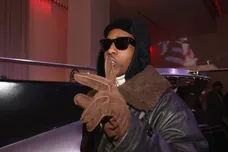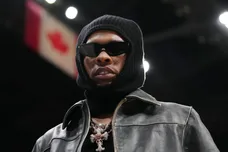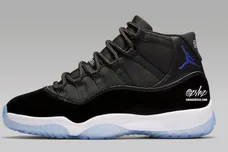Their heyday was 47 years ago, but The Beatles still have the most number one hits in the history of Billboard's Hot 100 chart. No one, not Michael Jackson, Mariah Carey, Rihanna, nor Madonna has been able to equal or top the record 20 #1s they produced between 1964 and 1970. Hip hop isn't a genre that's historically paid much homage to the Fab Four, but recently, two rap groups that have flirted with Beatles comparisons have found themselves sitting atop the charts.
Rae Sremmurd's "Black Beatles" is a more optimistic reimagining of a line from Kanye West's 2010 track "Gorgeous" ("What's a black Beatle anyway, a fucking roach?"), with Swae Lee and Slim Jimmi using the group's fashion, sex appeal, and commercial success as signifiers of their own rockstar lifestyle. A scene from the video even mimics The Beatles' final live performance. Migos hit #1 directly after "Black Beatles" with "Bad and Boujee," but their Beatles connection dates back a few years, when the "Migos are better than The Beatles" meme swept the internet. Their recent hit doesn't make any explicit references to that (unlike 2015's "Migos Origin"), but its success has sparked a rebirth of the meme, with both Donald Glover and indie rock band Japandroids declaring Migos our generation's Beatles last month.
Neither "Black Beatles" nor "Bad and Boujee" went #1 because of their respective connections to the most successful singles group of all time, but like The Beatles' loud, shaggy-haired swag did in 1964, they seem to represent a revolution, or at least a breath of fresh air to an increasingly bland Hot 100. The three #1s that preceded The Beatles' first chart-topper (1964's "I Want to Hold Your Hand") include of two songs that sound like slow dance staples at old folks' homes, and a novelty hit by a singing nun. 2016, in comparison, had Drake's most parent-friendly song yet ("One Dance"), a random-as-hell collaboration between Sia and Sean Paul ("Cheap Thrills"), and a smash hit by some "frat bro dudes" that ripped off an adult contemporary song from a decade prior-- not exactly as whitewashed and sterile as 1963's list of hits, but just as boring.
In both Rae Sremmurd's and Migos' tracks, you've got something that's exceedingly rare in the Billboard Hot 100 of the 2010s-- songs performed and produced solely by young black guys who are rapping, not singing, (save for Swae Lee and Lil Uzi Vert's occasional melodies) and who aren't accompanied by a more commercially familiar pop star. Desiigner's the only other artist to hit #1 with those criteria last year (though a good deal of the track's success came from Kanye West), and his "Panda" was the highest-charting rap song with no singing since Nicki Minaj's "Anaconda," which hit #2 in 2014, as my colleague Trevor Smith pointed out last year.
Put bluntly, "Black Beatles" and "Bad and Boujee" aren't pop songs. More accurately, they're not songs by pop artists. It used to be fairly common for straight-up rap tracks to hit #1-- 2003-2004 had Eminem's "Lose Yourself," 50 Cent's "In Da Club" and "21 Questions," Nelly's "Shake Ya Tailfeather," Ludacris' "Stand Up," Juvenile's "Slow Motion," Terror Squad's "Lean Back," and Snoop Dogg's "Drop it like it's Hot" in the top spot-- but before this year, the last time two rap songs without guest vocalists singing the hook went #1 back-to-back was when Soulja Boy's "Crank Dat" and Kanye West's "Stronger" did it in Fall 2007. In the nine years after that, the charts got much poppier and whiter. R&B fell off the Hot 100 almost entirely-- in stark contrast to the days when Usher and Beyoncé reigned supreme-- and rappers seemed to only hit #1 when they got Rihanna or Charlie Puth to sing the hook.
So how did this happen? How were two tracks by young, Southern rappers and producers able to do what one full decade of hit rap songs couldn't? Obviously, a ton of it has to do with each song's sheer quality in the rapping and production departments, but why weren't other worthy, trendy tracks in the recent past-- think Bobby Shmurda's "Hot N****," Rich Gang's "Lifestyle," or Fetty Wap's "Trap Queen"-- able to hit #1? There's no one glaring answer, but rather a combination of factors:
Labels (finally) becoming internet- and rap-savvy
Just a few years ago, it seemed like the "big four" record companies that control the lion's share of music sales (Universal Music Group, Sony Music Entertainment, EMI Group, and Warner Music Group) were woefully ill-equipped to deal with the new methods of marketing, streaming, and selling that have arisen since the decline of physical media. YouTube and Soundcloud became go-to hubs for buzzing new unsigned artists while major labels remained in conflict with streaming services, and when those artists did get signed, they were often either past their peak of hype or mishandled by A&Rs with little knowledge of modern trends in hip hop (see: Trinidad Jame$, Odd Future, Chief Keef, Azealia Banks). Media giants simply didn't know what to do with hip hop, which had adapted to a new internet-driven era much more quickly than these decades-old corporations. But enough with the history lesson.
Interscope (part of Universal Music Group), who co-released Rae Sremmurd's Sremmlife 2 with Mike Will Made It's EarDrummers Entertainment, has been exploring "non-traditional" ways of marketing music, and finally hit paydirt with "Black Beatles." According to a Pigeons & Planes interview with Interscope's Gunner Safron, they recruited online marketing brand Pizzaslime to "create content" that prominently featured the song. "The goal was to become the soundtrack to all the things that plug up your timeline," said Safron. Pizzaslime eventually targeted the already-existing Mannequin Challenge as the perfect avenue for "Black Beatles" to sneak itself into the lives of people who otherwise wouldn't be listening to Rae Sremmurd, and as Safron said, "fed it to the youth." Having previously worked on projects by big-name artists like Diplo and Dillon Francis, as well as some major Hollywood films, Pizzaslime's difficult-to-quantify services must come with a hefty pricetag by this point, but in this case, their vision and influence seemed to be worth it.
Migos, on the other hand, have benefitted from being signed to the savviest label out there: 300 Entertainment. Starting in 2014, the company has signed artists like Young Thug and Fetty Wap whose careers could have very well gone the way of Chief Keef's-- with all of the biggest potential hits dropping unauthorized on YouTube and SoundCloud before they're able to be monetized-- and ensured that every song, mixtape, and album released is official and for sale. The first single Migos dropped while signed to 300? "Fight Night," which peaked at #69 (nice) on the Hot 100, easily beating out their previous peak of #99 with "Versace." Was "Fight Night" really that much of a bigger song than "Versace," which seemed to dominate the conversation for a few whole weeks in 2013? Probably not, but therein lies the value of having 300 on your side. 2015's Yung Rich Nation album was a rare misstep for 300, and last year, the Migos seemed pretty annoyed at the label for delaying their impending sophomore album, but the ship was finally righted with a number #1 album and single in Culture and "Bad and Boujee." When asked to comment on the mechanism behind the song's success, a representative 300 declined saying, "[We] want the guys to get the credit for making an incredible song." As we all know though, Migos have tons of incredible songs. I'm going out on a limb here, but 300 probably just doesn't want their marketing strategy out in the open. Whatever the case, there's no doubt in my mind that "Bad and Boujee" benefitted from whatever push the label gave it.
Careful consideration of Billboard's chart calculation methods
The Billboard Hot 100 used to be determined by a simple blend of physical sales and radio airplay, but today, it's pretty damn confusing. As of 2014, the Hot 100 is calculated using three subcategory singles charts: Radio Songs (which measures terrestrial and satellite airplay), Streaming Songs (measuring online traffic of services that include Spotify, Apple Music, Tidal, Pandora, Twitter, and YouTube), and Digital Songs (measuring online single sales). As Silvio Pietroluongo, vice president of charts and data development at Billboard, told The Ringer in a 2016 interview, “You’ll have Spotify streams, Apple Music streams, video plays on YouTube, you know, even incorporate user-generated clips that incorporate the actual music into our calculations. We have weighted factors, and there’s a formula to it.” The thing is, they have yet to reveal that exact formula, making it anyone's guess as to whether it's better to debut your track on Apple vs. Tidal, etc. Pietroluongo did offer some advice though. “The more places your song is, the more likely people are to stream it,” he said, "If you’re limiting it to one place, it may limit your total volume for the week.” He added that there are "certain times where a streaming service may not give us the information because it’s exclusive." So unless you're a huge artist, that Tidal exclusive probably does more harm than good.
Migos wisely dropped "Bad and Boujee" not just on commercial streaming platforms, but also on Soundcloud, which despite not being directly factored into Billboard's Streaming Songs equation (due to “a combination of factors,” per Pietroluongo), is more easily shared than a Spotify or Apple Music stream. Remember, Streaming Songs calculates not just streams, but also "traffic" and "user-generated clips," which means that an "omg Bad n Boujee [multiple flame emoji]" tweet counts, as do the popular clips of Migos performing the song in Nigeria and Sid the Science Kid dancing to it.
"Black Beatles" is a more interesting case, because it didn't drop until Sremmlife 2 arrived, at which point it was also released as a single. But Sremmurd and their label capitalized quickly, releasing the music video within ten days, and with the track absent from SoundCloud, watching the viewcount skyrocket (it's currently hovering around 380 million plays, about 200 million more than the "Bad and Boujee" video). You also had the Mannequin Challenge videos counting towards its numbers, and god only knows how many of those were generated.
It's near-impossible to guess what weight Billboard gives to all of these factors, but whereas Radio Songs and Digital Songs are difficult systems to game, the Streaming Songs arena has turned into a free-for-all of streams, shares, and memes. The winning idea seems to be making singles as accessible and shareable as possible, buy any memes necessary. As Gunner Safron told Pigeons & Planes in that aforementioned interview: "It’s almost like a new format of blogging. A few years ago everyone wanted to get placed on different blogs, and now you want to get on tumblr pages, on Instagram pages, and showcase your work through third parties where you don’t have to be the leader of the conversation. You can allow others to tell the story for you.”
Memes
As mentioned in the section above, the bits of internet ephemera that we usually call "memes" have become a surprise factor in singles' success, particularly in hip hop. Unless you only follow people ages 40 and over, you undoubtedly saw many a Mannequin Challenge, "Raindrop, droptop" joke, and/or "When you're about to leave the club and you hear Offset say 'You know...'" meme flash across your timeline in the past six months. Song-generated memes are not particularly new-- remember Bobby Shmurda's hat, or the guy listening to Lil Yachty's "1Night" in his room?-- but Billboard seems to have gotten increasingly better at finding and counting each and every use of the song in viral videos and obscure lyrical references on Twitter. The first song that got a measurable boost on the charts from user-generated clips was Baauer's "Harlem Shake" in 2013, which inspired and was featured in thousands of YouTube videos whose viewcounts were factored as streams on the Streaming Songs chart. It was far from the first "viral" video challenge, but with Billboard just beginning to incorporate official and unofficial YouTube views earlier that year, "Harlem Shake" was clearly the first beneficiary of the new rules.
The fact that so much of Baauer's success came from memes was a big, unprecedented story when it first broke in 2013. These days, spit on the internet and you'll hit at least one sloppy thinkpiece about the success that memes have wrought upon "Black Beatles" or "Bad and Boujee," while giving label marketing and the songs' actual quality little credit for their chart-topping. While both songs did benefit from listeners' actively creating and sharing related content, that's also true about every pop single since 2013 to some extent, so the bigger story here is how labels now actively court (or pay for) content creation, and why certain songs like these seem to infiltrate the public consciousness more so than others.
Zeitgeist
You'd be hard-pressed to pinpoint one overarching reason why everyone wanted to do Chubby Checker's "Twist" in 1960, or the "Macarena" in 1993, or the "Soulja Boy" in 2007, rather than the dance moves described in other contemporary songs, but there's often a few time-stamped reasons why a particular song succeeds in a particular era. This temporal trendiness is commonly called "zeitgeist" (German for "spirit of the age" or "spirit of the time"), which means capturing certain aspects of culture at their peak, with the result feeling very "of the moment."
Rae Sremmurd and Mike Will Made It, in this case, decided to put veteran rapper Gucci Mane on "Black Beatles" right at the time when Gucci was receiving the most press of his career, his post-prison victory lap rendering him much more visible and marketable than he was as an eccentric trap rapper a decade prior. There was also a bit of reverse-gaming going on with memes in that song, something Sremmurd have done throughout their career, where Swae Lee incorporates the already-existing "Get you a man that can do both" cliche into his lyrics. Throw in a reference to El Chapo, who according to Genius has steadily become a more frequent fixture in rap lyrics since 2010, and you've got a song that will be undeniably 2016 in the annals of history: a meme- and outlawed drug kingpin-referencing #1 single that features Gucci Mane.
"Bad and Boujee" features an even more zeitgeisty guest in Lil Uzi Vert. Gucci may still have some haters, but most of hip hop has come around to him on grounds of his legacy. Uzi, though, is among the most-hated and most-debated in rap right now. On one hand, kids love him; on the other, older "serious" rap fans are working furiously to put up the same blockades against him that they once threw at Gucci. The joke's on the haters though, because both of these demographics end up helping out the song. One search of "Uzi verse boujee" on Twitter reveals that most tweets containing those words are negative (most hilariously in the case of a user called "Lil Uzi's Verse" with the handle "@OnBadAndBoujee" whose only tweet reads "Is trash."), but if you'll remember from Billboard's new rules, any mention of the song title counts in its favor. Dissing a track verbatim on a public forum is kind of like hate-sharing an article you disagree with-- the author and site still get the clicks! It's not just Uzi's undeniable popularity that's boosted "Bad and Boujee," it's the fact that amidst a heated debate about "mumble rap" in hip hop, the track contains a wildly unconventional verse from the new generation's purple-haired pariah. 10 years down the line, when Uzi's been normalized to rap listeners, his mere presence probably won't be this much of a commercial boon... that is, unless he's fresh out of a years-long prison stint and newly-sober.
~~~~
Again, I feel that it's important to stress that "Black Beatles" and "Bad and Boujee" are great. fucking. songs. None of this success would be possible without Mike Will Made It's shimmering synthpop beat, Swae Lee's acrobatic delivery, Offset's indelible hook, or Quavo's Ratatouille punchline. But as we all know, quality does not automatically predict popularity, and many other deserving tracks have failed to even hit #100, let alone #1. What we've seen on America's biggest chart in the past three months is unprecedented for the 2010s, and it didn't happen because Rae Sremmurd and Migos made the two definitive greatest songs of the past five years or anything. Less-than-obvious factors outside, as well as inside the music drive it first into public consciousness, then to the Hot 100 in a non-organic fashion (although, with the increased role of listeners and content-creators in this process, you could argue that it's gotten more organic). Billboard's set of criteria, rap labels' mastery of marketing and distribution, the dominance of memes, and artists' harnessing of the zeitgeist are all time-specific factors that seem to have coalesced to make the Hot 100 a viable territory for youthful, rap-centric music once again, and at the very least, we should be thankful for that.
I'll close with a set of honorable mention songs that also benefitted from these factors last year, as well as a couple of still-rising new ones that have potential to follow in the footsteps of "Black Beatles" and "Bad and Boujee."
2016 Honorable Mentions
D.R.A.M. Feat. Lil Yachty - "Broccoli" (Hot 100 peak: #5)
Drake & Future - "Jumpman" (Hot 100 peak: #12)
Yo Gotti - "Down in the DM" (Hot 100 peak: #13)
Kevin Gates - "2 Phones" (Hot 100 peak: #17)
Potential future chart-toppers
Migos - "T-Shirt" (This week on the Hot 100: up 18 places from #37 to #19)
KYLE Feat. Lil Yachty - iSpy (This week on the Hot 100: up two places from #29 to #27)









